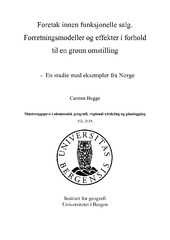| dc.description.abstract | As the resources available on Earth is being depleted in a rather worryingly pace, the need for more efficient production systems and products arise. This calls for a greener economy, where material resources are looped into a circular system. Circular economy is one of the models that can be used for this purpose. In this system, resources are being exploited in a way that limits the use of energy, resources and minimize waste. One way to strive for circular economy is to implement functional sales into business models. This thesis is based on the strategies and performances of companies performing functional sales in different markets and sectors. It seeks to distinguish the different effects functional sales have on the transition to a greener economy. It will not measure them scientifically, but rather try to map out the different effects functional sales have on a green economy. The study will analyze different approaches to functional sales, including sharing services, reparation and restoration, reuse and remanufacturing. Functional sales are closely related to some other key concepts, servification and product service systems respectively, and they will therefor be presented and clarified early in this study. The study will further investigate the different companies included in terms of their strategies and their effects on the green economy. In theory, there are four different combinations that can be distinguished. They include companies that A) have a green strategy and a green effect, B) have a green strategy, but does not have any green effects, C) do not have a green strategy, but have a green effect due to side effects of its operations, and finally, D) do neither have a green strategy or any significant green effects. This study will argue as to which one of these categories the different companies included in this study belong to. The study is based on semi-structured interviews with nine different companies that practice functional sales in Norway. Eight of them are small and medium-sized enterprises, and one is larger. Together, they cover a broad specter of sectors, B2B and B2C markets with different geographical range (local, regional, national and international). This makes for a foundation to be used to answer the main research question: What function does functional sales have in regards to the transition to a greener economy? The study concludes that functional sales do indeed play an important role in the transition to a greener economy. Functional sales contribute to a greener economy by enabling resource saving and opening up for more efficient use of resources in general. It is also paves the way for sustainable customer service. However, functional sales are challenged by geographical borders, and can also be subject to rebound-effects. | en_US |
